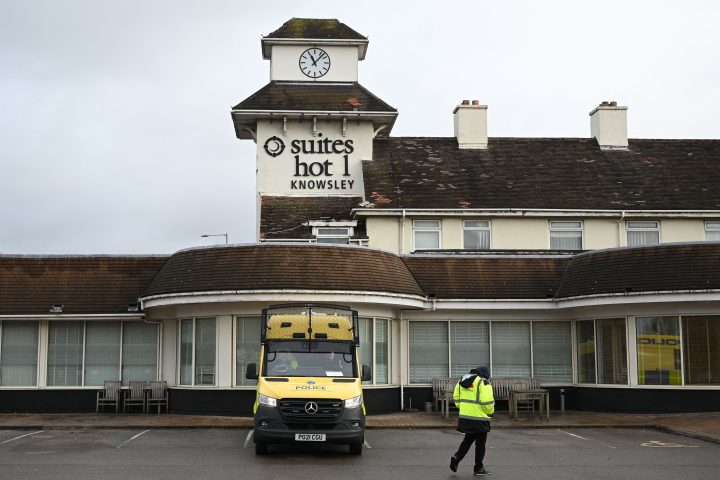This week’s public disorder outside a hotel accommodating asylum seekers in the town of Knowsley in Merseyside was in some ways inevitable.
A total of 45,756 people entered the UK on small boats via the English Channel last year – which, according to the 2021 Census, is a number larger than the entire population of English towns such as Dover in Kent, Boston in Lincolnshire and Kirkby in the Metropolitan Borough of Knowsley. Britain’s asylum regime should be prioritising the world’s most persecuted peoples, especially women and girls at major risk of sex-based violence in their conflict-ridden homelands. Instead, it has been reduced to a survival-of-the-fittest system which has been taken to the cleaners by people-smuggling enterprises importing predominantly young, able-bodied men into the country. According to recent French data, people smugglers made £183 million from small-boat crossings last year.
But what has been a long-standing injustice which is all too often overlooked is the distribution of asylum seekers in the UK. That political slogan ‘we’re all in this together’ doesn’t apply in most spheres of life – including the rehoming of newcomers. One notable example is where asylum seekers (some clearly being illegal Channel economic migrants from countries such as Albania, which has not experienced conflict since the 1997 civil war), have been relocated in recent times, which should be at the forefront of any debate in this area of public policy.
Knowsley is the definition of left-behind. It needs emergency-level public investment and social support
The blunt truth is that the UK’s internal dispersal system has been a failure for some time. Back in April 2017, it was revealed that more than five times as many destitute asylum seekers live in the poorest third of the country as in the richest third. According to the Guardian’s analysis of Home Office data at the time, a comfortable majority of all asylum seekers – 57 per cent – housed by the government were placed in the poorest third of the country. A more recent analysis last year found that almost one in four asylum seekers in the UK supported by the Home Office was housed in just ten local authorities – the majority of which are among the most deprived in the country. Along with cities such as Glasgow, Cardiff, and Stoke-on-Trent, it included northern towns such as Rochdale, Middlesbrough, Hartlepool, Stockton-on-Tees, and Gateshead.
The current state of affairs is not sustainable and risks intensifying social tensions in underprivileged communities where there is a perceived competition for limited resources. It is a select number of deprived inner-city areas and left-behind provincial towns which are doing much of heavy lifting when it comes to accommodating asylum seekers – which is morally unjust as well as being a genuine threat to community cohesion.
What should also be highlighted is the degree to which the Home Office fails to provide appropriate forms of notification to local councils when it comes to the rehoming of asylum seekers. Knowsley Council previously said it had been given less than 48 hours’ notice in January last year that the Home Office intended to temporarily accommodate asylum seekers at the Suites Hotel. This is nothing but top-down centralised imposition of asylum-seeker relocation by Whitehall on a hyper-deprived local authority in north-west England.
Knowsley is a corner of the country which is blighted by a myriad of severe social and economic problems. For the 2020-21 academic year, Knowsley recorded the lowest average ‘Attainment 8’ score (across eight GCSE-level qualifications) out of all English local authorities. According to data published in June last year, it has the highest percentage of state-funded secondary pupils who are eligible for free school meals in the whole of England – nearly half, at 46.4 per cent. The recent lack of A-level provision on offer in the Merseyside borough meant that many of its students had to travel outside of it to continue their studies – making trips to St Helen’s College or sixth forms in Liverpool to do their exams. The 2021 England and Wales Census revealed that Knowsley had the country’s highest proportion of residents who were identified as being ‘disabled and limited a lot’. It is also in the top five local authorities for the percentage of people aged five years and over who provided a form of unpaid care – 11.5 per cent, which is marginally behind the highest local authority (neighbouring St Helens at 11.7 per cent).
Knowsley is the definition of left-behind. It should be identified as a place in need of emergency-level public investment and social support – not one that is treated as some sort of asylum-seeker relocation ground in the middle of the country’s border-security and cost-of-living crises.
The Knowsley disorder should be a wake-up call for this beleaguered Conservative government. It must not only shore up the UK’s border security, but ensure that the system for dispersing asylum seekers across the country is a much fairer one for the most deprived areas in the country.






Comments